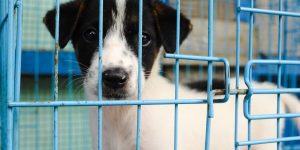What Is the Law On Puppy Breeding in the UK?
In this article, Holidays4Dogs discusses the The Animal Welfare (licensing of Activities Involving Animals) (England) Regulations 2018 and outlines laws that puppy breeders need to be aware of. Read on to find out more about the laws on puppy breeding in the UK.
From the 1st October 2018 the Animal Welfare Act had have several new amendments added. The purpose, was to close a number of loopholes that previous legislation had allowed.
The main objective of the Act is to help curb irresponsible breeders, such as puppy farmers breeding puppies for profit. It also provides purchasers with clear criteria to look for when communicating with puppy sellers. Responsible breeders will not be affected by the legislation.
Implications for puppy breeders.
Since 1st October 2018 anyone who breeds and sells for profit, more than three litters of puppies, (previously five litters) within a twelve month period, must be licenced as a business with their local authority (Selling Animals as Pets Licence). This, then, strongly points to the fact that people must also register with HMRC.
If three litters from pet dogs are bred in the period of twelve months, breeders will be deemed to be running a business.
However, if breeders are earning a profit, (fees from the activity of breeding puppies) you will still need a license irrespective of the number of litters produced.
Third party puppy sales.
Breeders are not the only individuals who will be subject to these new regulations. Anyone who is in the business of moving puppies around, or acting as agents, will also need a licence.
The purpose of this is to clamp down on traders and, indeed, after many campaigns by animal welfare parties, in 2020 the government finally banned third party puppy sales altogether.
of this is to clamp down on traders and, indeed, after many campaigns by animal welfare parties, in 2020 the government finally banned third party puppy sales altogether.
This means, puppies (or kittens) must be sold directly from the breeder, or from a rescue centre.
The legislation came into force in April 2020 and was named ‘Lucy’s Law’ after a cavalier king charles spaniel rescued from appalling puppy farm conditions.
Sadly, there are still dealers who try to flout this law, but pretending puppies were brought up in a home.
Often excuses are made as to why the mother of the puppies isn’t present. It is always be wise to be vigilant when purchasing a puppy – particularly when it comes to internet sites – (also see below).
Other requirements set out in the amended legislation include;
-
The puppy must be viewed with its biological mother, unless there is medical evidence to show why this is not possible.
-
There must be an adequate programme of socialisation of the puppies and this must be implemented and documented.
-
No puppy under 8 weeks may be sold, or separated from its biological mother, except on grounds of health and welfare.
-
Licence holders must take all reasonable steps to make sure puppies are free of genetic abnormalities and are of an acceptable temperament, physically fit and healthy.
-
Dogs which have had corrective surgery in order to rectify exaggerated conformation, (such as breathing difficulties in bulldogs for example), must not be bred from.
-
Bitches that have had two caesarean sections must not be bred from again.
-
All dogs on the premises must be vaccinated against canine diseases.
Licences will be granted for a period of 1-3 years on a rolling basis and on a risk based system. In practice, this means new licence holders will be assessed and provided with a star rating.
This will indicate their current standards, as well as taking into account experience, facilities and feedback from puppy owners.
Those individuals who are awarded a high rating, will be inspected less frequently – (up to 3 years). As a result, they will also attract reduced inspection fees.
Under the new laws, breeders will have to keep sales records. In addition, they must adhere to new rules on advertising dogs for sale.
Any dog a breeder advertises must include the following information;
-
The licence holders registered licence number.
-
The name of the issuing authority.
-
A recognisable photograph of the actual dog being advertised.
-
The age of the dog being advertised.
It is hoped the new laws will go much further in protecting the health and welfare of puppies in England. It should, in theory, go a long way to eradicating unscrupulous puppy farmers and traders. This includes tackling the issue of people importing puppies from abroad.
This legislation should  not affect responsible dog breeders adversely. Indeed, the point of the new law, is to tackle irresponsible breeders and dealers, who have benefited from loopholes in the current legislation.
not affect responsible dog breeders adversely. Indeed, the point of the new law, is to tackle irresponsible breeders and dealers, who have benefited from loopholes in the current legislation.
Furthermore, the legislation attempts to tackle the issue of the suitability of dogs being bred from.
For example, bull breeds being born unable to breathe in alarming numbers and subsequently, requiring corrective surgery. This is an issue which is becoming increasingly common in veterinary practices across the UK.
If you are planning to breed a litter of puppies and are unsure of your obligations, Holidays4Dogs strongly advises you contact your local authority. You can read detailed information on the legislation here.



